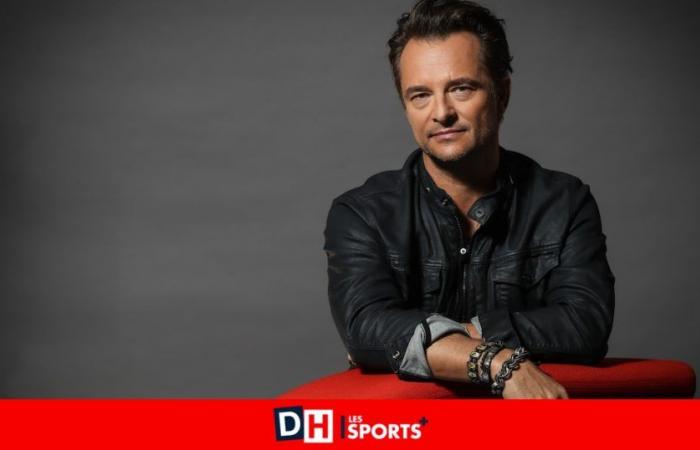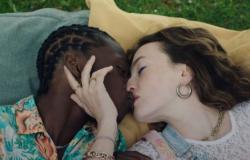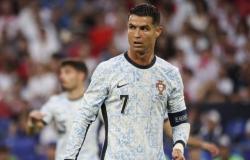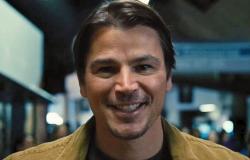Four years after Imagine the World, a year after the release of his autobiography Best Album, David Hallyday is back with a project that is very close to his heart: the double album Requiem for a Madman and the tour that will accompany it. On the menu: 19 titles. Songs from his repertoire but also – above all, one is tempted to write – from that of his father, such as the emblematic “Quelque chose de Tennessee”, “Diego”, “Laura” and “Requiem pour un fou”. And revisited extracts from “Blood for Blood”, the album he wrote for his father and which remains Johnny’s most popular album this evening.
A record designed for the stage as a tribute to his father. It will be the subject of a major tour which will last until… 2027! Kick-off on November 4 in Mulhouse with a visit to Forest National on April 13.
While in Brussels this week, DH met David Hallyday to gather his secrets.
David Hallyday will be in Belgium in April 2025 with a “blood for blood” Hallyday show
What motivated you to take the recovery step?
“I started to cover songs of mine that were important, that opened up this career for me. Others too, from my first albums. I found that certain productions from the 80s had aged a little. So why not to redo songs that I composed for my father that come from the album “Sang pour sang”. Finally, if I’m there, why not explore further in my discography and his.”
Was it a complicated project?
“It was complicated to take things that are very emotional in a repertoire that, for the most part, does not belong to me. It was a little uncomfortable in the sense that you are touching on an enormous repertoire. And then, it was necessary to make something that holds up and, above all, that resembles me. The difficulty, it was there. It is ultimately about continuing to tell what we started to tell together with the album “Sang pour sang” that I composed for him, which is a family album. It is a family story for generations, both on my mother’s and father’s side. I was educated in this value of transmission, of what we can leave as traces at home. I wanted to tell it and it became Requiem pour un fou.”
Was there not a moment’s fear of touching the sacred by revisiting your father’s catalog?
“Yes. That’s why it wasn’t easy. At the same time, I still put myself at my father’s service. We both managed to do something really good. There was a little fear at the beginning, but once I had my head down, you’re not afraid anymore, you just go for it.”
Are there any titles that you have forbidden yourself from touching?
“No. I had to make a selection, of course. Because over a 50-year career, I wasn’t going to spend ten years making fourteen albums. But there was something interesting, which is what I compose for myself and what I composed for him has nothing to do with it, neither melodically, nor in the construction of the music, nor from a harmonic point of view. Hence this question: how am I going to make all these tracks, his and mine, maintain a coherence on the album? It’s not easy. It’s my vision of the thing to make an album as if it were me.”
How did you choose the titles?
“I took emblematic titles for him that resonate with me. Or titles that I heard when I was a kid. For example, ‘Requiem pour un fou’, it came out in 76. I was ten years old. I heard him repeat this title. For me, my father’s favorite musical years are definitely the 70s. A good part of the 80s, with the album Gang (1986). He had three very prolific years with Michel Berger’s album then Goldman’s. Then a bit of the 90s until the 2000s, until Sang pour sang. I went that far because for me, these are the years that I preferred of his with titles like ‘Laura’. You can imagine that it was a piece that I wanted to cover for my sister. It’s his song, she really cares about it and it’s magnificent.”
Did you make your sister Laura Smet listen to your version?
“I made her listen to it at Christmas when it wasn’t finished yet. I didn’t want to but she pushed me and I gave in. She was really moved and thanked me 10,000 times. It was important for me to succeed with this song. I wanted her to like it, I know she wants it.”
David Hallyday makes rare confidences about the disappearance of his father: “My sister and I, the children, were not able to accompany him”
Was it an emotional lift to dive back into all those tapes of your father?
“On Sang pour sang, it was crazy stuff. It wasn’t easy, but it brought emotion to the interpretation. I had done this song alone when I remade it, but I decided to make it a duet because we sang it together so much. At first, I had just taken his voice from the masters (the original recording tapes, Editor’s note) and I had left the one I had done for myself. But there was a gap in the emotion. So I redid my part in the same conditions of the time. Revisiting my own songs, with all my memories of the United States, when I was a kid, my first steps, was also moving. I make the association with my autobiography because it was one of the triggers for this album. Requiem pour un fou is a compilation of pretty much everything I talk about in the book in fact.”
What will it be like when you perform these songs on stage…
“I conceived this album in terms of stage. In fact, it’s like I’m releasing the album live. It’s going to be a big concert, a big machine. It’s going to be interesting. It’s an important tour to my eyes because there is this family project, this story that I am telling There are things that are going to be difficult for me on an emotional side Doing things in your studio is one thing. emotion with the public that you feel, that you see, it’s another thing. It’s a strong thing, it can tie your throat. I think people like that it’s not a robotic thing but something. human.”
Did you also listen to this album to your mother, Sylvie Vartan? What did she think?
“My mother is in the United States. She is coming back for a series of concerts also in November. The only thing she listened to with me was when I was going to finish ‘Requiem for a Madman’. I told her I listened to it live. It did something to him, that’s for sure.”
Haven’t you thought about covering her songs?
“Why not? I’ve already done it. I covered ‘Irrésistiblement’ which I love. I did it in quite a rock way. Here, it’s Sang pour sang. It’s a story with my father, it’s not the same thing When my father made his first Stade de France, we went to eat afterwards, during dinner, my father-in-law Tony Scotti had an idea that he loved: that. we made an album as a threesome, with my mother, my father and me, and a tour together, a bit like the Jackson Five. I would have made the album and then we would have gone on tour. “Would have been great but it never happened.”
Did you make Laeticia Hallyday listen to Requiem for a Madman?
“Of course, yes, we do things normally.”
David Hallyday publishes his autobiography: “I will never forgive”
In your autobiography Meilleur album, you mention a second album, Sang pour sang, which never saw the light of day. Why?
“I have no regrets about that. I did well to say no because we live in a society of overconsumption where we have to abuse everything. And I’m not for that. When you succeed in doing something complicated and you were lucky enough to come across something that was emblematic, I don’t want to reproduce it for the simple fact of doing it. I said no to remaking an album right after Sang pour sang because we had really succeeded with it. We had spent intimate moments together, things that are difficult to reproduce on purpose. I didn’t want to betray that. I wanted it to remain intact. I wanted there to be only one reference of my work for him.”
Did making this album free you from a weight?
“It didn’t free me from anything. On the other hand, I discovered a lot of things. For example, how much I was influenced by my father’s music when I was little. When I started composing songs on the piano, I was six or seven years old and I’ve always been influenced by Anglo-Saxon music. I lived in the United States for 37 years and I started my career there. By having been in the top 30 in the United States and having toured with rock groups, I thought I had been influenced melodically by Anglo-Saxon music. Today, I think I was more influenced by my father’s songs than I thought.”






